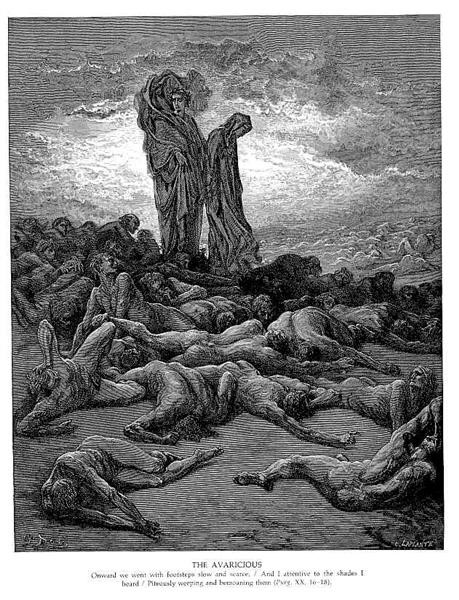“All who die in God’s grace and friendship, but still imperfectly purified, are indeed assured of their eternal salvation; but after death they undergo purification, so as to achieve the holiness necessary to enter the joy of heaven.”
From the Catechism of the Catholic Church
Purgatory is traditionally defined by the Catholic Church as a temporary state of being somewhere between heaven and hell. Purgatory is for those who have not fully deserved heaven and are not so unworthy as to be damned. According to the Catholic Encyclopedia, these “have not fully paid the satisfaction due to their transgressions.”
The teaching is found implied in the Old Testament, in Second Maccabees, where Judas, the commander of the forces of Israel,
“making a gathering . . . sent twelve thousand drachmas of silver to Jerusalem for sacrifice to be offered for the sins of the dead, thinking well and religiously concerning the resurrection (For if he had not hoped that they that were slain should rise again, it would have seemed superfluous and vain to pray for the dead). And because he considered that they who had fallen asleep with godliness, had great grace laid up for them. It is therefore a holy and wholesome thought to pray for the dead, that they may be loosed from sins.”(2 Maccabees 12:43-46)
St. Paul also weighs in.
“For other foundation no man can lay, but that which is laid; which is Christ Jesus. Now if any man build upon this foundation, gold, silver, precious stones, wood, hay stubble: Every man’s work shall be manifest; for the day of the Lord shall declare it, because it shall be revealed in fire; and the fire shall try every man’s work, of what sort it is. If any man’s work abide, which he hath built thereupon, he shall receive a reward. If any man’s work burn, he shall suffer loss: but he himself shall be saved, yet so as by fire.” (1 Corinthians 3:11-15)
“Yet so as by fire” suggests a period of suffering that qualifies as atonement for our sins. Tertullian, Origen, Ambrose, Augustine, Cyril of Jerusalem, and other Early Fathers of the Church confirmed the early Christian belief in a state of purification that later theologians would call “purgatory.”
The concept of purgatory is a very reasonable one, and applies even to us in our present life. When we commit crimes, we either exult in them, or show no remorse and risk the judge throwing the book at us; or we may confess our crimes and throw ourselves upon the mercy of the court. But it makes no sense, no matter how contrite we may be for our crime, no matter how much we beg for mercy, that the judge should let us off with no penalty (purgatory) whatever. For any crime a degree of suffering is exacted. For rape, theft, or perjury, it is expected that we should be deprived of our liberty and sent to a place (prison-purgatory) where we can hope for release to the freedom and redemption that is one day to come.
Human nature cries out not only for mercy, but also for justice. In the Garden of Gethsemane, Jesus also cried out for mercy when he asked if this cup of suffering could pass from his lips. But to obtain true and merciful justice, that was not possible. He had to suffer his own ‘purgatory’ on the cross – not for Himself, the Holy and Just One, but for all of us, to open the gates of heaven for all who deserve to enter.
What St. Augustine said: “That there should be some fire even after this life is not incredible, and it can be inquired into and either be discovered or left hidden whether some of the faithful may be saved, some more slowly and some more quickly, in the greater or lesser degree in which they loved the good things that perish, through a certain purgatorial fire.”
Clearly, Augustine’s remarks should lay to rest the claim by some Protestants that the Catholic doctrine of purgatory was invented in the 11th century.











